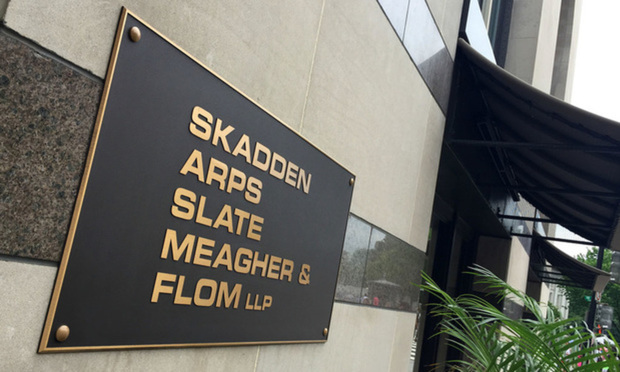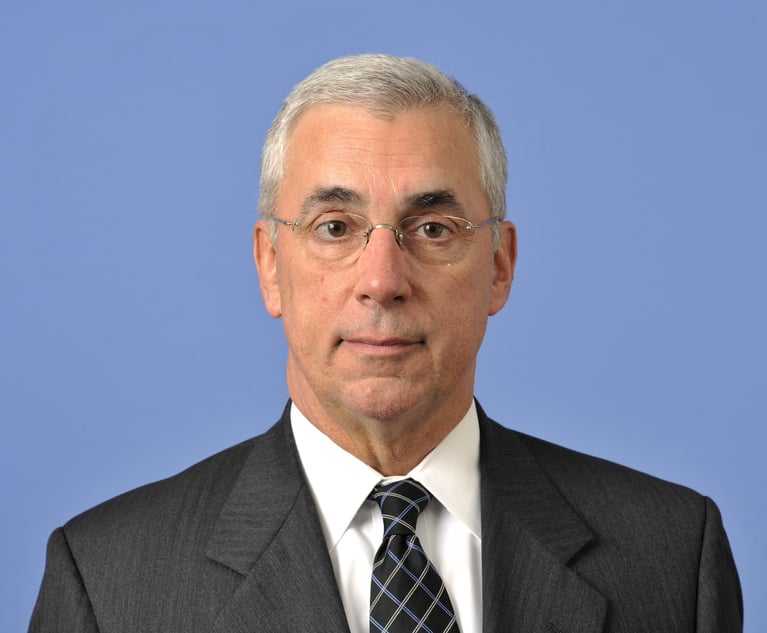Mueller's Team Touts Skadden's 'Extensive' Cooperation in Foreign-Lobbying Case
Prosecutors are trying to block an indicted Russian company, represented by a team from Reed Smith, from prying into the government's recent civil settlement with Skadden over its advocacy for Ukraine.
February 05, 2019 at 11:41 AM
4 minute read
 Skadden offices in Washington, D.C. Credit: Diego M. Radzinschi/ NLJ
Skadden offices in Washington, D.C. Credit: Diego M. Radzinschi/ NLJ
The special counsel's office on Tuesday publicly praised Skadden, Arps, Slate, Meagher & Flom for its cooperation in a U.S. Justice Department foreign-lobbying investigation, drawing a distinction between the New York law firm and an indicted Russian company that claims it is unfairly facing criminal prosecution.
Defense lawyers for the Russian firm Concord Management and Consulting, charged with participating in a plot to interfere in the 2016 election, argue the company is the victim of selective prosecution and should be allowed to probe how Skadden inked a civil settlement with prosecutors and was not charged in any criminal case.
Skadden last month agreed to pay $4.6 million to resolve claims that the law firm failed to properly disclose its past work for Ukraine. Reed Smith partner Eric Dubelier said Skadden was “permitted to purchase a declination,” while Concord has been forced to fight a raft of criminal charges.
Prosecutors working with the special counsel, Robert Mueller III, said the allegations against Concord “are not remotely similar” to the accusations that the Justice Department's national security division levied against Skadden. The firm, as part of the settlement, belatedly reported its advocacy under the Foreign Agents Registration Act, the federal law governing U.S. lobbying for foreign governments.
Prosecutors accused the law firm of not reporting its work on a purportedly independent analysis of the prosecution of former Ukrainian Prime Minister Yulia Tymoshenko. Former Skadden partner Greg Craig, an Obama-era White House counsel, was a leading attorney on the advocacy. Craig retired amid the Justice Department's investigation and has not been charged with any crime.
“The law firm is not alleged to have condoned the former partner's actions, let alone also to have engaged in anything akin to the numerous acts of deception and concealment as alleged against Concord,” the special counsel's office wrote. “Nor is the former partner, let alone the law firm, alleged to have participated in any systemic effort to engage in U.S. election interference as the indictment describes.”
Prosecutors said Skadden “cooperated extensively with the investigation into the matter, and that the law firm has undertaken affirmative steps to enhance its internal procedures and processes.”
The special counsel's new court filing referred to Skadden only as “the law firm” and to Craig as “a former partner.” Skadden said in a statement last month: “We have learned much from this incident and we look forward to putting these events behind us.”
William Taylor III of Zuckerman Spaeder, a lawyer for Craig, has maintained he was not required to register his work under the foreign-agents registration law.
In a court filing last month, Dubelier pointed to the Skadden settlement in an attempt to put Concord's alleged conduct in a more favorable light. Dubelier said it appeared “at a minimum” Skadden conspired to defraud the government and made material false statements to the Justice Department.
“And the difference is that Skadden agreed to pay over $4.6 million to the United States so as not to be prosecuted (which is no penalty at all because it simply deprives the firm of its allegedly unlawfully earned revenue), and Concord stands accused of a crime having not been offered the purchase declination option,” Dubelier wrote.
“The disparate treatment by the government of these two matters,” he added, raises the question of why the Russian firm was indicted while Skadden was able to resolve the allegations by paying more than $4.6 million, representing the income it received from Ukraine. Dubelier described Skadden as a sophisticated law firm with offices around the globe, “including in Moscow.”
The defense lawyer argued Skadden's admitted conduct is “far more direct, obvious, and egregious than the allegations against Concord—yet Skadden was not prosecuted.”
U.S. District Judge Dabney Friedrich has not ruled yet on whether to allow Concord's lawyers to probe the Skadden settlement.
Read more:
Skadden Registers Ukraine Advocacy After Settling DOJ's Lobbying Case
Mueller's Interest in Skadden Presents Unique Crisis Management Challenge
Skadden Settlement Spotlights Greg Craig's Ukraine Work
Ex-Skadden Associate Gets 30-Day Jail Sentence for Lying to Mueller's Team
This content has been archived. It is available through our partners, LexisNexis® and Bloomberg Law.
To view this content, please continue to their sites.
Not a Lexis Subscriber?
Subscribe Now
Not a Bloomberg Law Subscriber?
Subscribe Now
NOT FOR REPRINT
© 2025 ALM Global, LLC, All Rights Reserved. Request academic re-use from www.copyright.com. All other uses, submit a request to [email protected]. For more information visit Asset & Logo Licensing.
You Might Like
View All
Dissenter Blasts 4th Circuit Majority Decision Upholding Meta's Section 230 Defense
5 minute read
Justice 'Weaponization Working Group' Will Examine Officials Who Investigated Trump, US AG Bondi Says

Judge Pauses Deadline for Federal Workers to Accept Trump Resignation Offer

Judge Accuses Trump of Constitutional End Run, Blocks Citizenship Order
3 minute readTrending Stories
- 1Family Law Practitioners Weigh In on Court System's New Joint Divorce Program
- 2State Bar Ethics Opinion Determines Texas Lawyers Can't Join a Firm With Non-Lawyer Partners
- 3'Don't Be Afraid:' AGs Push Against Trump's Immigration Policy
- 4State AG Hammers Homebuilder That Put $2,000-Per-day Non-Disparagement Penalty in Buyer Contracts
- 5Selendy Gay Files Lawsuit Challenging Trump's Workforce Reclassification EO
Who Got The Work
J. Brugh Lower of Gibbons has entered an appearance for industrial equipment supplier Devco Corporation in a pending trademark infringement lawsuit. The suit, accusing the defendant of selling knock-off Graco products, was filed Dec. 18 in New Jersey District Court by Rivkin Radler on behalf of Graco Inc. and Graco Minnesota. The case, assigned to U.S. District Judge Zahid N. Quraishi, is 3:24-cv-11294, Graco Inc. et al v. Devco Corporation.
Who Got The Work
Rebecca Maller-Stein and Kent A. Yalowitz of Arnold & Porter Kaye Scholer have entered their appearances for Hanaco Venture Capital and its executives, Lior Prosor and David Frankel, in a pending securities lawsuit. The action, filed on Dec. 24 in New York Southern District Court by Zell, Aron & Co. on behalf of Goldeneye Advisors, accuses the defendants of negligently and fraudulently managing the plaintiff's $1 million investment. The case, assigned to U.S. District Judge Vernon S. Broderick, is 1:24-cv-09918, Goldeneye Advisors, LLC v. Hanaco Venture Capital, Ltd. et al.
Who Got The Work
Attorneys from A&O Shearman has stepped in as defense counsel for Toronto-Dominion Bank and other defendants in a pending securities class action. The suit, filed Dec. 11 in New York Southern District Court by Bleichmar Fonti & Auld, accuses the defendants of concealing the bank's 'pervasive' deficiencies in regards to its compliance with the Bank Secrecy Act and the quality of its anti-money laundering controls. The case, assigned to U.S. District Judge Arun Subramanian, is 1:24-cv-09445, Gonzalez v. The Toronto-Dominion Bank et al.
Who Got The Work
Crown Castle International, a Pennsylvania company providing shared communications infrastructure, has turned to Luke D. Wolf of Gordon Rees Scully Mansukhani to fend off a pending breach-of-contract lawsuit. The court action, filed Nov. 25 in Michigan Eastern District Court by Hooper Hathaway PC on behalf of The Town Residences LLC, accuses Crown Castle of failing to transfer approximately $30,000 in utility payments from T-Mobile in breach of a roof-top lease and assignment agreement. The case, assigned to U.S. District Judge Susan K. Declercq, is 2:24-cv-13131, The Town Residences LLC v. T-Mobile US, Inc. et al.
Who Got The Work
Wilfred P. Coronato and Daniel M. Schwartz of McCarter & English have stepped in as defense counsel to Electrolux Home Products Inc. in a pending product liability lawsuit. The court action, filed Nov. 26 in New York Eastern District Court by Poulos Lopiccolo PC and Nagel Rice LLP on behalf of David Stern, alleges that the defendant's refrigerators’ drawers and shelving repeatedly break and fall apart within months after purchase. The case, assigned to U.S. District Judge Joan M. Azrack, is 2:24-cv-08204, Stern v. Electrolux Home Products, Inc.
Featured Firms
Law Offices of Gary Martin Hays & Associates, P.C.
(470) 294-1674
Law Offices of Mark E. Salomone
(857) 444-6468
Smith & Hassler
(713) 739-1250








